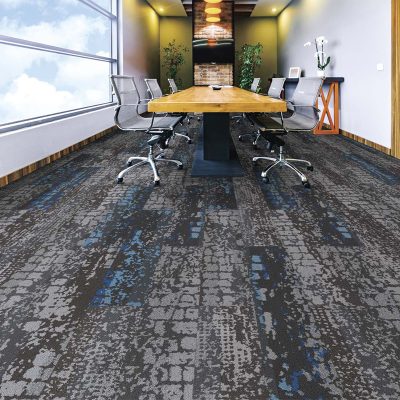Carpet tiles can offer several benefits from an eco-friendly perspective, making them a popular choice for environmentally conscious consumers. Here are some of the key advantages of carpet tiles in terms of sustainability:
- Material Efficiency: Carpet tiles are often more material-efficient compared to traditional broadloom carpet. They typically come in smaller sizes, allowing for more precise usage of materials during manufacturing. This can help reduce waste and minimize environmental impact.
- Modularity and Reusability: Carpet tiles are modular, meaning they can be easily replaced or rearranged as needed. This modularity extends the lifespan of the flooring because individual tiles can be swapped out in case of damage or wear, without requiring replacement of the entire carpet. Additionally, when removing carpet tiles, they can often be reused or recycled, reducing landfill waste.
- Recycled Content: Many carpet tile manufacturers offer products with recycled content. This may include recycled fibers from sources such as plastic bottles or reclaimed carpet materials. By incorporating recycled materials into their products, carpet tile manufacturers help reduce the demand for new raw materials and divert waste from landfills.
- Energy Efficiency: The manufacturing process for carpet tiles can be more energy-efficient compared to traditional carpet production. Some manufacturers utilize energy-saving technologies, such as efficient machinery and renewable energy sources, to minimize energy consumption and greenhouse gas emissions during production.
- Improved Indoor Air Quality: Some carpet tiles are designed with eco-friendly materials and adhesives that emit fewer volatile organic compounds (VOCs) compared to traditional carpet products. This can contribute to better indoor air quality and a healthier living or working environment.
- Longevity and Durability: High-quality carpet tiles are designed to be durable and long-lasting. Their resilience to wear and tear means they need to be replaced less frequently, reducing the overall environmental impact associated with flooring replacement and disposal.
- Water Conservation: Certain carpet tile materials, such as recycled nylon or polyester fibers, require less water to manufacture compared to natural fibers like wool. This can help conserve water resources and reduce the environmental footprint of carpet tile production.
Overall, carpet tiles can be an eco-friendly flooring option due to their material efficiency, modularity, use of recycled content, energy-efficient manufacturing processes, and potential to improve indoor air quality. When choosing carpet tiles, consumers can look for products certified by organizations such as the Carpet and Rug Institute’s Green Label or those meeting standards like LEED (Leadership in Energy and Environmental Design) for sustainable building practices.








